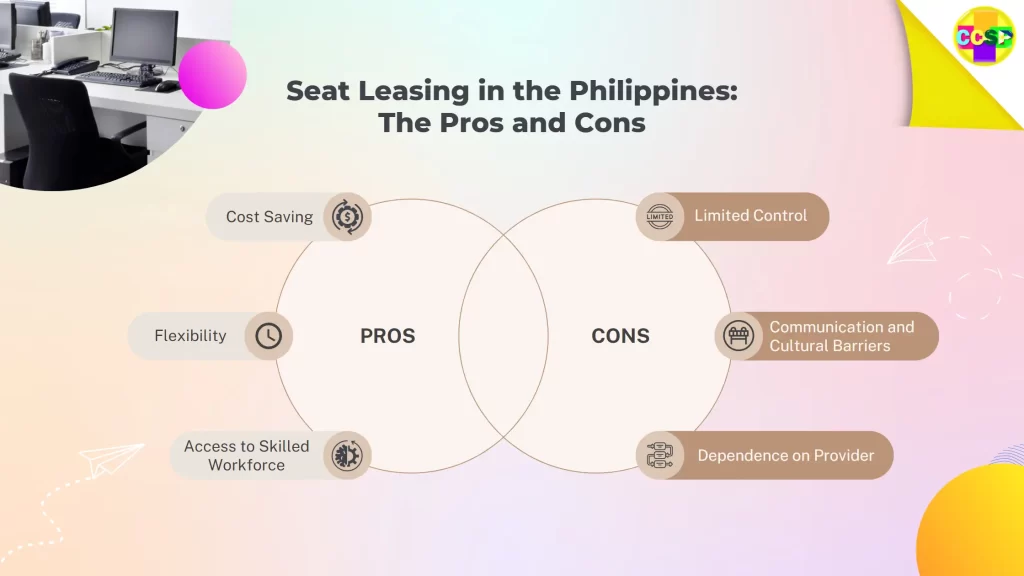
- Seat Lease
- June 08, 2023
Have you ever thought of moving your business to the Philippines? Or at the very least expand towards this BPO-centric country?
Seat leasing has become increasingly popular in the Philippines as a cost-effective and flexible office space solution.
However, like any business decision, it’s important to consider the pros and cons before committing to a seat leasing deal.
In this article, we’ll dive deeper into the advantages and disadvantages of seat leasing in the Philippines, helping you make an informed decision on whether this option is right for your business.
Pros of Seat Leasing in the Philippines
1. Cost Savings
One of the primary benefits of seat leasing is cost savings. The Philippines is known for its affordable office space rates, and seat leasing is no exception. Providers often offer fully furnished workstations with high-speed internet, electricity, and other amenities, which can save businesses a significant amount of money compared to setting up their own office space.
Moreover, seat leasing providers take care of the day-to-day maintenance and repairs, which saves businesses time and money on upkeep. For small to medium-sized businesses who need to allocate their resources wisely to fuel their growth, seat leasing can be an excellent option.
2. Flexibility
Another advantage of seat leasing is its flexibility. Providers offer leasing terms that can range from a few months to several years, allowing businesses to adjust their operations based on their current needs without being tied down to a long-term lease. This flexibility is particularly attractive for businesses that are still testing the waters in the Philippines.
Moreover, seat leasing providers offer a wide range of office space options, from hot desking to private offices. Businesses can easily scale up or down based on their changing needs, making seat leasing an excellent option for companies that are growing quickly.
3. Access to Skilled Workforce
The Philippines is known for its pool of skilled workers in the BPO industry. Seat leasing providers often offer office space in prime locations where skilled workers are readily available, which can be a significant advantage for businesses that need to quickly expand their operations and access a skilled workforce.
Moreover, seat leasing providers offer additional services such as recruitment and HR support to help businesses find and retain the best talent for their operations. This can be particularly beneficial for businesses that are new to the Philippine market.
Cons of Seat Leasing in the Philippines
1. Limited Control
When businesses opt for seat leasing, they are essentially renting office space from a third-party provider. This means that they have limited control over the space and facilities. Some businesses may find this limiting, particularly if they have specific requirements that cannot be accommodated by the provider.
Moreover, seat leasing providers often have strict policies on customization and decor, which can limit a business’s ability to create a personalized and branded workspace. Businesses that prioritize control and customization may find seat leasing limiting in this regard.
2. Communication and Cultural Barriers
If a business is operating from another country, they may face communication and cultural barriers when working with Philippine-based seat leasing providers. These can cause miscommunications and misunderstandings that can affect the business’s operations.
For example, language barriers can lead to misunderstandings in contracts and agreements, while cultural differences can impact business practices and expectations. Businesses should be prepared to navigate these barriers and work closely with their seat leasing provider to ensure smooth operations.
3. Dependence on Provider
Finally, businesses who opt for seat leasing may become dependent on their provider for office space and facilities management. This can be a disadvantage if the provider experiences any problems or goes out of business.
Businesses should carefully consider the financial stability and reputation of their seat leasing provider before signing any agreements. They should also have a contingency plan in place in case their provider experiences any problems that could impact their operations.
In summary, seat leasing can be a cost-effective and flexible option for businesses looking to expand in the Philippines. The cost savings, flexibility, and access to a skilled workforce make it an attractive option for small and medium-sized businesses.
However, it’s important to consider the potential drawbacks of seat leasing, such as limited control over the space, communication and cultural barriers, and dependence on the provider.
To ensure a successful seat leasing experience, businesses should do their due diligence and research potential providers thoroughly. They should also work closely with their provider to establish clear communication and expectations, and be prepared to adapt to any cultural differences.
Overall, seat leasing can be an excellent solution for businesses looking for cost-effective and flexible office space options in the Philippines.
By carefully weighing the pros and cons and doing their due diligence, businesses can make an informed decision on whether seat leasing is the right choice for their operations.




